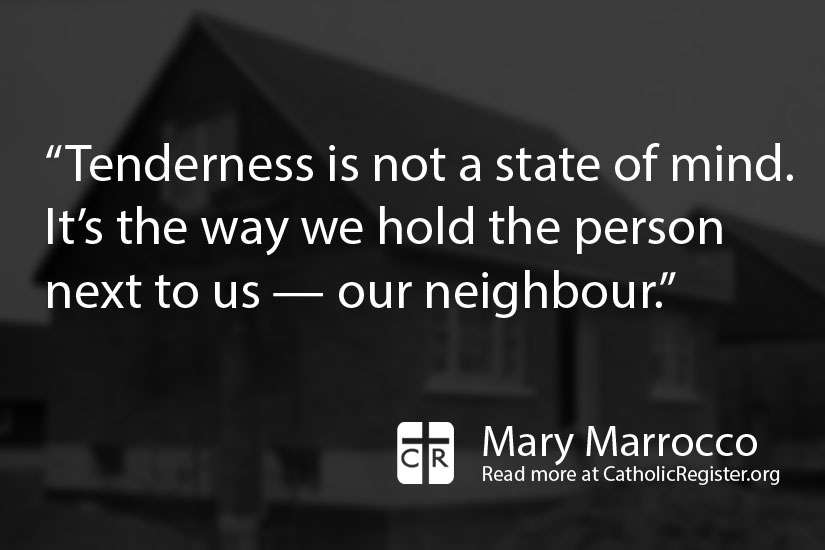Building co-operatively meant they could afford their own homes. “Sweat equity” meant CMHC gave them a mortgage based on their commitment to doing the work themselves, together. It meant serious labour, hard feelings and hurdles, and it meant people inspired and changed by co-operating in concrete ways that affected their daily lives.
One of the priests working with the families said: “Its principles were focused on building people, not houses. Don’t know how we missed that, but we did for a long time.”
It’s a story of Canadian Catholic history, and personal for me. The co-operatives were inspired by the Antigonish Movement, itself informed by Frs. Moses Coady and Jimmy Tompkins. My uncle, Francis (Fr., then Bishop) Marrocco, carried this vision to Ontario, helping establish Ottawa’s Institute for Social Action (now, sadly, defunct). Rita Larsen, his trusty administrative assistant, later became his sister-in-law; later, my mother; later still, his posthumous biographer. Fr. Marrocco was instrumental in the Grimsby initiative. Rita’s book The Light From One Candle helped tell the story.
So, exhibit-creators Janet and Paul Muise invited her to Grimsby’s Museum. I escorted. We met people who helped build the homes, and people who grew up in them: the real-life results of this word “co-operation.”
“Co-operative” simply means “working together,” but when it comes to humans, that’s not so simple.
“Unless there is sufficient education in co-operation principles from the very beginning, the development of the co-operative may be disappointing and the association more susceptible to failure.” So notes the Social Action Institute’s Guide to Co-operative Housing, which the families studied for a year before they began building. Such co-operation can happen because humans are naturally inclined that way, but it often doesn’t because of our deep and stubborn resistance to our need of each other.
We aren’t suddenly, magically able to co-operate as members of the same body. Yet when we do manage to co-operate, it works great change in us. Belonging to the Body of Christ inspires and exhorts us to live like that: to not do separately what we can do together. To care for and assist one another in the concrete. To remember the other’s needs at least as much as our own.
“Membership in a co-op organization is impossible to those who will not have the welfare of others, as well as self, at heart,” said Fr. Marrocco. Rita says she wondered then why he talked all the time about the Mystical Body of Christ, and wonders now why nobody talks about it.
Maybe some of us want to have others’ welfare at heart, but find it hard to stretch beyond our self-interest. What can help us? The spirit is willing but the spirit takes flesh in matter, which is notoriously weak (Mt 26:41).
Matter is weak, but open to spirit. We can readily discover this truth when we feel the wind open our hearts to God’s Spirit, when a white-and-green birch tree reaching up to the intense blue sky raises our hearts to our Creator, when the delight of swimming in a clear lake brings us closer to Christ who loved the Lake of Galilee. When the kiss of a beloved brings joy. When bread offered by friend or stranger feeds soul as well as body.
When 60-year-old houses witness people’s faith in God and each other.
One of my favourite stories about the Grimsby co-operative, recounted in Rita’s book, discusses the families’ distress over deciding how to allocate the finished houses. Who would get which? Everybody had worked on them all, but everybody knew that some people had worked much harder than others. At a “heated” meeting, they were on the verge of deciding by vote whether those who were “labour delinquent” would get last pick. Then somebody turned to the man who’d done more than anybody, saying, “Buzz, what do you think?”
“Buzz thought quietly about it and then answered: ‘Well, if I were living next door to somebody who didn’t get in as many hours as I did, and was penalized for that, I think it would make my house of less worth to me.’ The vote was taken and it wasn’t even close. No penalties were made. We were painfully democratic. And Christian.”
Painfully Christian. Being Christian can be painful, as being renewed in the likeness of Christ can be painful.
“These days,” writes Pope Francis, “more than anything, people need tenderness.”
Tenderness is not a state of mind. It’s the way we hold the person next to us — our neighbour. It’s matter, our own flesh, radically open to spirit, the spirit in us breathing the Spirit of God.
(Marrocco can be reached at marrocco7@sympatico.ca.)


